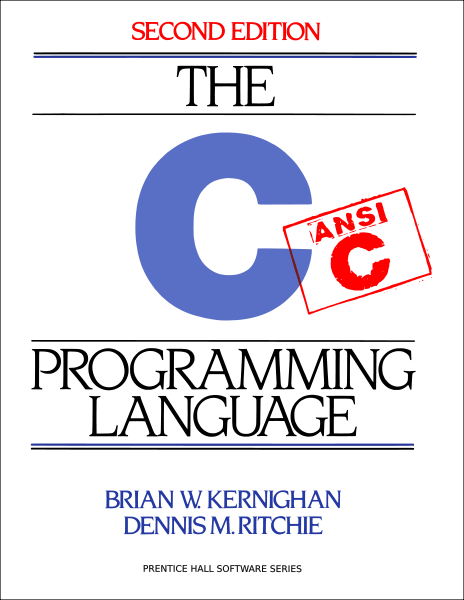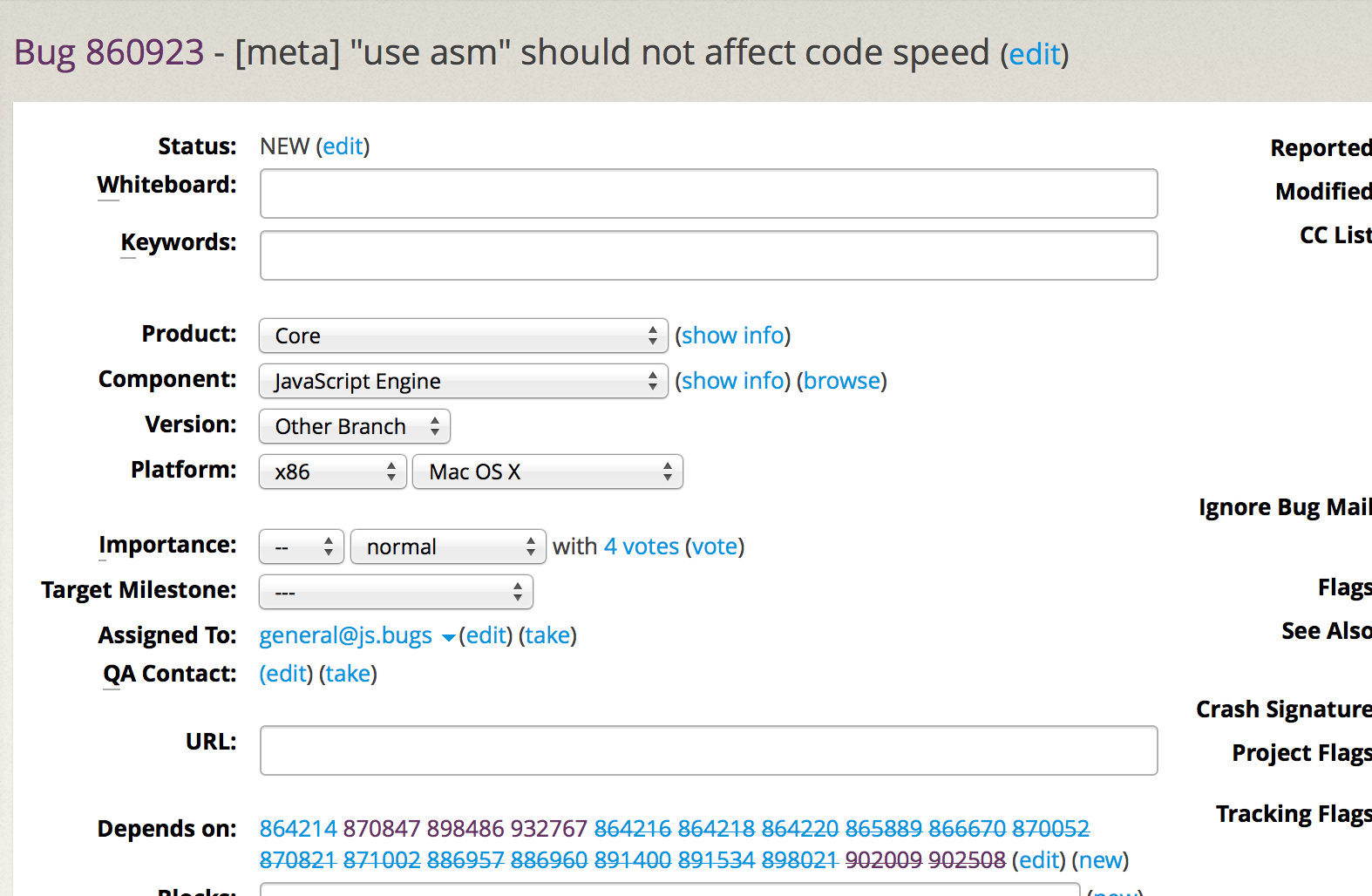High-Performance WebGL Apps with LLJS and asm.js
CascadiaJS 2013





How possible?! wow
Machine Types
// signed 32-bit integers
(4.6 | 0) === 4
(2147483648 | 0) === -2147483648
// unsigned 32-bit integers
(-4 >>> 0) === 4294967292
Machine Types
32-bit integers all the way through
((4.6 | 0) + (5.7 | 0) | 0) === 9

It's fast because:
- 100% type consistency
- no garbage collection (manually managed memory in large typed array)
It's a good target for C/C++ apps, more realistic target than PNaCl in the long term since it can be used today
oh no, controversy
You might be interested in this for:
- games
- number crunching
- video processing
- anything CPU intense
yes, JavaScript is missing a few things
- 64-bit integers
- 32-bit floats
- SIMD
- pthreads
but a lot of it is coming (probably not pthreads though)
Let's give it a name
asm.js
asm.js-style code
- hand-written
- slightly verbose
for(var i = 1; i < 16; i++) {
var br = 255 - ((func() * 96) | 0);
var brr = (br + i) | 0;
}
asm.js spec
- compiler generated
- more explicit
- still completely valid JS, no special forms
function asmModule(globals, env, heap) {
"use asm";
var F4 = new globals.Float32Array(heap);
var random = env.random;
function main(x) {
var i = 0, br = 0, brr = 0;
for(i = 1; (i | 0) < 16; i = (i | 0) + 1 | 0) {
br = (255 - (((func() | 0) * 96) | 0)) | 0;
brr = (br + i) | 0;
}
// usually reads/writes from types arrays (like F4)
// a lot as well
}
return { main: main };
}
Ahead-of-time (AOT) compiling
- relatively easy to integrate with existing JIT
- highly optimized without much work
- reliable performance
- a lot of subtle benefits


Ahead-of-time (AOT) compiling

JIT compiling
- ignores "use asm"
- focuses on asm.js-style code
- performance not as guaranteed

- but everybody should do this anyway


Current Benchmarks
Current Benchmarks

So how can I use it?
emscripten
https://github.com/kripken/emscripten
C/C++ -> LLVM -> JavaScript
- preferred method
- battle-hardened
Low-Level JavaScript (LLJS)
My fork: https://github.com/jlongster/LLJS
- a fun experiment
- adds bits of C to JavaScript
- optional C-like types and manual memory management
pointers
let int x = 5;
let int *y = &x;
*y = 10;
// x equals 10
functions & stack allocated data
function void process(int* nums) {
for(let int i=0; i<1000; i++) {
nums[i] = i * 2;
}
}
function void run() {
// stack allocated
let int nums[1000];
nums[0] = 5;
process(nums);
}
type casting & structs
struct vec2 {
function void vec2(double x, double y) {
this->x = x;
this->y = y;
}
double x;
double y;
}
function double length(vec2 *v1) {
return sqrt(v1->x * v1->x + v1->y * v1->y);
}
function void run() {
let vec2 point(100, 150);
let double len = length(&point);
let int rounded = int(len * 1000);
}
optional typing
struct vec2 {
double x;
double y;
}
let canvas = document.createElement('canvas');
let ctx = canvas.getContext('2d');
function render() {
let vec2 points[10000];
// do some heavy processing on points
ctx.fillStyle = 'red';
for(let int i=0; i<10000; i++) {
ctx.fillRect(points[i].x - 2,
points[i].y - 2,
4, 4);
}
}
The ubiquitous vector
function foo() {
var point = { x: 5, y: 10 };
return point.x;
}
function foo() {
var point = [5, 10];
return point[0];
}
mat3.determinant = function (a) {
var a00 = a[0], a01 = a[1], a02 = a[2],
a10 = a[3], a11 = a[4], a12 = a[5],
a20 = a[6], a21 = a[7], a22 = a[8];
return a00 * (a22 * a11 - a12 * a21) + a01 * (-a22 * a10 + a12 * a20) + a02 * (a21 * a10 - a11 * a20);
};
LLJS vector
struct vec2 {
double x;
double y;
}
function double foo() {
let vec2 point;
point.x = 5;
point.y = 10;
return point.x;
}
look ma, no GC
function foo() {
var _ = 0.0, $SP = 0;
U4[1] = (U4[1] | 0) - 16 | 0;
$SP = U4[1] | 0;
F8[(($SP)) >> 3] = +5;
F8[((($SP)) + 8 | 0) >> 3] = +10;
return +(_ = +(+F8[(($SP)) >> 3]), U4[1] = (U4[1] | 0) + 16 | 0, _);
}
struct vec2 {
double x;
double y;
}
struct line {
vec2 pos1;
vec2 pos2;
}
function void foo() {
let line AB;
AB.pos1.x = 5;
AB.pos1.y = 10;
AB.pos2.x = 20;
AB.pos2.y = 15;
}
pointers again
struct vec2 {
double x;
double y;
}
function update(vec2 *v) {
// ...
}
function foo() {
let vec2 pointA;
let vec2 *pointB = &pointA;
pointB->x = 5;
let vec2 *pointC = new vec2();
}
+---------------+
0 | Heap Pointer |
1 | Stack Pointer |
+---------------+ <- Heap Pointer (HP)
| |
| | |
| HEAP | | Malloc Region
| | v
| |
+---------------+
| |
| | ^
| STACK | |
| | |
| |
+---------------+ <- Stack Pointer (SP)
function foo() {
var _ = 0.0, $SP = 0;
U4[1] = (U4[1] | 0) - 16 | 0;
$SP = U4[1] | 0;
F8[(($SP)) >> 3] = +5;
F8[((($SP)) + 8 | 0) >> 3] = +10;
return +(_ = +(+F8[(($SP)) >> 3]), U4[1] = (U4[1] | 0) + 16 | 0, _);
}
compiler internals
- 1. parse (esprima, patched with types)
- 2. lift (estransform)
- 3. resolve types & scan
- 4. transform
- 5. lower
- 6. generate (escodegen)
estransform
BlockStatement.prototype.transform = function(o) {
if(this.shouldTransform) {
return new OtherTypeOfNode(this.argument);
}
};
Identifier.prototype.transformNode = function(o) {
this.internalName = '$' + this.name.value;
};

- pure LLJS: asm.js module (fully typed)
- mixed LLJS: asm.js-style code mixed with js (partially typed)
What I did
- forced type annotations on every expressions
- wrapped code in asm.js module with "use asm"
- fixed lots of various syntax forms to make it validate
- rehauled some of internal representations of pointers
https://github.com/jlongster/LLJS
ljc code.ljsljc -a -m core -e init,update code.ljsmy custom fork, original repo is at mbebenita/LLJS
TODO
- clean up the minefield of bugs
- dynamic allocation (malloc/free)
- sourcemaps
- better integration between mixed and pure LLJS modules
- maybe even rethink some language features
demo #1
codedemo #2
codedemo #3
codethanks!
@jlongster